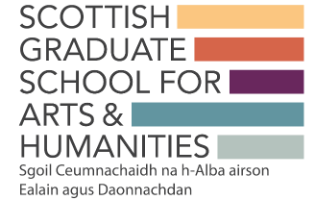AHRC Collaborative Doctoral Partnership PhD studentship. North to the Arctic: a Scottish view of Inuit technology 1779-1939
Application deadline: Monday 11 April 2016
The University of Aberdeen, in partnership with National Museums Scotland & with support from the Smithsonian Institution, is seeking to appoint a suitably qualified applicant for a full-time collaborative PhD studentship to undertake a study of the Arctic collections in the National Museums Scotland. The studentship will commence on 1 October 2016 & will last for three years.
This is an exciting opportunity to pursue an original doctoral research project within the Department of Anthropology, University of Aberdeen, whilst working closely with National Museums Scotland expertise & collections. The Department of Anthropology, University of Aberdeen, has the largest concentration of anthropologists working in the Circumpolar North within the UK, and one of the largest internationally. The Anthropology of the North & Histories of Museums & Material Cultures are established research themes within the department. The National Museums Scotland is renowned for its curatorial expertise as well as its world-leading publications. In addition to producing an original PhD dissertation based on the National Museums Scotland collections, the research will support public programming activity at National Museums Scotland & reinterpretation of the collections which may be disseminated online.
The studentship
For well over two centuries Scots have travelled to the Arctic in the pursuit of scientific knowledge & economic gain. Their engagements with local people have resulted in a material legacy which today can offer challenging perspectives on dominant narratives of cultural encounters. This studentship will examine the rich Arctic collections at National Museums Scotland to examine Scottish involvement in histories of Arctic exploration & knowledge production. To achieve this, the research will consider the collections in terms of individual artefacts, personal biographies & institutional assemblages.
The Arctic collections in Edinburgh are extensive (c.1200 items) and include some of the very earliest collections acquired in polar regions. Yet, despite their potential for illuminating the complex historic relations between Scots & local people in the Arctic, these collections have not been systematically analysed. Arctic material culture is one of the foundations upon which the National Museums Scotland (NMS) was built: opening in 1862 the Museum displayed Inuit technology alongside modern machinery. Since this time collections formed by Scots on voyages of exploration & Hudson’s Bay Company traders have been a key resource for indigenous & non-indigenous scholars. Their material legacy demonstrates a distinctly Scottish shape to the production of knowledge & understanding of the Arctic. The studentship will examine & historicize the collecting practices which resulted in these important yet under-researched collections. The research will explore their contemporary relevance as technological legacies & as records of encounter, important to understanding Inuit traditional ecological knowledge.
A motivated student is required who is keen to capitalize on this opportunity to develop his or her ideas, skills, and research independence in a highly supportive environment. Experience of working with museum collections and/or archives is desirable, though training in these areas will also be provided according to the student’s needs. A demonstrated interest in the Circumpolar North is also desirable. Please note that this studentship will not include fieldwork in the Arctic. The student will be based in Aberdeen but will be expected to spend a considerable period of time in Edinburgh, working at the National Museums Scotland. The student will also be expected to spend time at the Arctic Studies Centre, Smithsonian Institution, Washington DC, where related collections to those of the NMS are housed, and ideally at the Hudson’s Bay Company Archives in Winnipeg, Manitoba. It is therefore essential that the student be prepared to travel in connection with this award. The successful candidate will have the opportunity to develop their theoretical & organisational approach in consultation with their supervisory team as the project develops. Possible research questions include:
- Collecting histories: What were the individual, governmental & institutional circumstances which led to the creation of these collections? To what extent was a mid-nineteenth century interest in technology a driving factor in object selection? How did Inuit & Inuvialuit concerns shape the collections in response?
- Curatorial histories: How did the National Museums Scotland curate these collections in the institution’s early history? What themes were the collections used to support?
- Technological histories: What technologies were used in the production of particular object types? How did collectors record this data? How did they ensure it was communicated? How can an examination of the skills represented in these collections & the associated documentation challenge dominant narratives about indigenous people current at the time the collections were assembled?
- Contemporary relevance: How can these early examples of skilled technologies be understood today? Given current environmental challenges, what are the technological lessons embedded in the collections? In what ways can they contribute to public understanding of people & technological processes in threatened environments?
Supervision
The student will be supervised by Dr. Alison Brown & Dr. Nancy Wachowich at the University of Aberdeen & Dr. Henrietta Lidchi Keeper of World Cultures, National Museums Scotland, with further support from Jonathan King, arctic material & museum specialist. The research environment at the Department of Anthropology at the University of Aberdeen is one of the most highly rated in the UK, according to the most recent UK Research Excellence Framework. The successful candidate will thus join an established & supportive research community, where they will receive training in such areas as: anthropological theory, research design & methods, academic writing, and data analysis. They may also have the opportunity to gain experience in teaching as part of their academic training. The student will additionally benefit from working in partnership with staff at the National Museums Scotland, and will receive training in public outreach, museum curatorship & artefact analysis. The student will be encouraged to attend & contribute to national & international conferences as appropriate during the course of their study.
Eligibility
Applicants must:
- Have or a first or upper-second class honours degree or equivalent in Anthropology, Archaeology, History, or a related subject.
- Have completed a masters-level qualification preferably in Anthropology, though related disciplines will be considered. We will also consider candidates who expect to have completed a relevant Master’s degree by October 2016.
- Be a resident of the UK or European Economic Area (EEA).
- In general, full studentships are available to students who are settled in the UK & have been ordinarily resident for a period of at least three years before the start of postgraduate studies. Fees-only awards are generally available to EU nationals resident in the EEA. International applicants are normally not eligible to apply for this studentship.
Funding Details
This award is funded by the AHRC through the Scottish Cultural Heritage Consortium. Subject to AHRC eligibility criteria, the studentship will cover Home/EU tuition fees & a stipend towards living expenses. The value of the stipend for 2016/17 is yet to be confirmed, however, for 2016/17 it is likely to be £14,296 plus a £550 additional stipend payment. In addition, National Museums Scotland will provide up to £1000 per year to contribute towards travel & related research costs. Additional Student Development Funding (equivalent to an additional 6 months of funding) will be available to allow time for further training & skills development opportunities that are agreed as part of the PhD programme. The studentship is covered by standard AHRC rules & guidance.
How to apply
Applications must be made through SRAS (Student Recruitment & Support) via the University of Aberdeen’s Postgraduate Applicant Portal.
Applicants should ensure they include all documentation required e.g., research proposal of approximately 1200 words, excluding bibliography, two academic references, degree certificate(s), degree transcript(s) and English language test results. The University cannot guarantee that incomplete applications will be considered. Applicants should note in their personal statement that they wish to be considered for the CDP North to the Arctic: a Scottish view of Inuit technology 1779-1939.
Closing date for applications: Monday 11 April 2016
Interviews are provisionally scheduled for April/May 2016. The interviews will take place in Edinburgh, though there is provision for them to be undertaken by Skype. Only short-listed candidates will be invited to interview.
Start date: 1 October 2016
Further information
Informal enquiries about the project’s scope can be made by contacting Dr. Alison Brown alison.brown@abdn.ac.uk or Dr Henrietta Lidchi h.lidchi@nms.ac.uk
For information on the Department of Anthropology, University of Aberdeen, visit: http://www.abdn.ac.uk/socsci/disciplines/anthropology/
For information on the World Cultures Department, National Museums Scotland, visit: http://www.nms.ac.uk/about-us/collections-departments/world-cultures/
First published: 4 March 2016
<< Past Events



